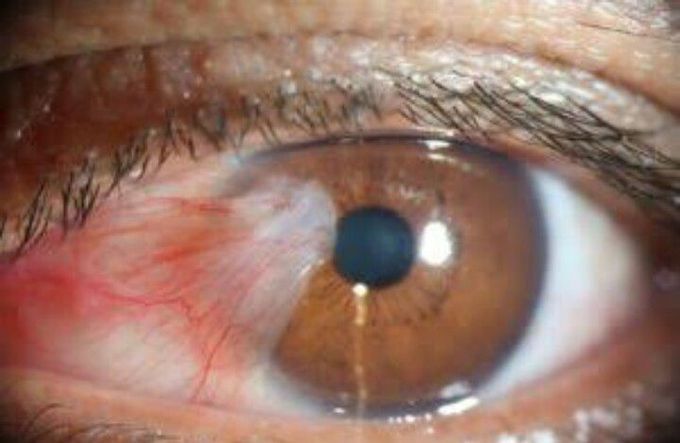


Pterygium
A pterygium is a growth of the conjunctiva or mucous membrane that covers the white part of your eye over the cornea. The exact cause of pterygium isn’t known. One explanation is that too much exposure to ultraviolet (UV) light can lead to these growths. It occurs more often in people who live in warm climates. People whose eyes are exposed to certain elements on a regular basis have a higher risk of developing this condition. These elements include pollen, sand, smoke and wind SUBSCRIBE Healthline uses cookies to improve your experience and to show you personalized ads. Privacy Policy. ACCEPTMore information Pterygium  Medically reviewed by Ann Marie Griff, O.D. — Written by Amanda Delgado — Updated on September 17, 2018 CausesSymptomsComplicationsDiagnosisTreatmentsPrevention Pterygium A pterygium is a growth of the conjunctiva or mucous membrane that covers the white part of your eye over the cornea. The cornea is the clear front covering of the eye. This benign or noncancerous growth is often shaped like a wedge. A pterygium usually doesn’t cause problems or require treatment, but it can be removed if it interferes with your vision. What causes it? The exact cause of pterygium isn’t known. One explanation is that too much exposure to ultraviolet (UV) light can lead to these growths. It occurs more often in people who live in warm climates and spend a lot of time outdoors in sunny or windy environments. People whose eyes are exposed to certain elements on a regular basis have a higher risk of developing this condition. These elements include: pollensandsmokewind A pterygium doesn’t always cause symptoms. When it does, the symptoms are usually mild. Common symptoms include redness, blurred vision, and eye irritation. You might also feel a burning sensation or itchiness. If a pterygium grows large enough to cover your cornea, it can interfere with your vision. A pterygium can lead to severe scarring on your cornea, but this is rare. Scarring on the cornea needs to be treated because it can cause vision loss. For minor cases, treatment usually involves eye drops or ointment to treat inflammation. In the more serious cases, treatment can involve surgical removal of the pterygium.

